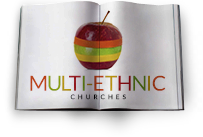Helping Asian Churches Become Multi-Ethnic
Many who have grown up in Asian churches understand that addressing the relationship between church and culture can be really tricky. There are sometimes strong differences of opinion about whether ethnic churches are healthy or helpful. Some Christians argue that ethnic churches should not exist because our ultimate identity is in Christ and in him all believers are unified. It is easy to use passages like Galatians 3:28 as prooftexts to claim that there really should not be any ethnic churches. There are others, and especially those who have grown up in ethnic churches, who understand that the greater issue may not be as much about being divisive as it is about fulfilling a need.
What complicates matters further is that different Asians will have varying degrees of opinion about how important it is to maintain a sense of ethnic culture in church (or even about what an ethnic church is). It is most important, generally speaking, to the first generation of immigrants. Many of these people came to the United States for their children, to offer them greater opportunities in life. In this sense, they did not necessarily come for their own personal reasons or to assimilate into the American culture. When the first generation comes together for worship, it is typically in their native language, and maintaining their Asian heritage is essential to their identity.
With each subsequent generation, the issue of ethnicity becomes more convoluted. The second generation, those who are born in the United States but have immigrant parents, experience an array of cultural influences. Some parents understand that they are in a new setting and that their children will lose some sense of ethnic identity. It’s inevitable. Other parents feel threatened by this potential loss for their children. It seems unbearable. Of course, all of this is highly oversimplified and generalized, and there are innumerable factors when thinking about what all this means for church from an ethnic point of view.
One of the realities about church ministry in an Asian-American context—whether you find this unfortunate or not—is that people of a particular ethnicity tend to congregate with others of the same ethnicity. This is why you so often find not “Asian” churches but more specifically Korean churches, Vietnamese churches, Chinese churches, Taiwanese churches, Japanese churches, and so on. For many of these churches, the goal is not to create ethnic divisions. It is to provide a context of ministry that targets their particular culture and/or language.
Because of these factors, having a truly multiethnic church can be difficult because the way to go about it may not necessarily be to ask people to lose their sense of cultural identity. I think this is the problem many churches have with becoming multiethnic. They attempt to create a sort of melting pot where every cultural identity demands little importance. The problem with this approach is that those who are from different ethnic backgrounds are often unwilling to lose their cultural and ethnic identity. It’s akin to asking them to forfeit a part of who they are. It’s not surprising, therefore, that most churches that assert themselves to be “multiethnic” are on the whole predominantly Caucasian with a spattering of other races.
Instead, in order to achieve a truly multiethnic and multicultural church, it seems there needs to be greater cultural sensitivity. The leaders in the church, in particular, must understand that most cultures do not want a melting pot as much as an acknowledgement of cultural identity. To use a culinary analogy, perhaps a truly multiethnic church would look less like a monochrome chowder and more like a varicolored minestrone. This is understandably difficult to maintain, which is probably why so many churches remain in their ethnic circles. That is simply easier than learning about other cultures and how to work around their cultural differences.
In application, I appreciate the apostle Paul’s approach to ministry. In 1 Corinthians 9:19, he writes, “For though I am free from all men, I have made myself a slave to all, so that I may win more.” He continues that to the Jew, he became like a Jew, and to those outside the Law, he was “as without Law” (9:21). The Apostle Paul said that he became all things to all people that he might save some. I do not think it is a stretch to say he made room for cultural sensitivity so long as it did not violate God’s truth. He did not insist that everyone be pressed into one particular cultural mold.
There are churches made up primarily of Asian-Americans whose desire is to become more multiethnic. Throughout our short history at Lighthouse Bible Church in San Diego, our membership has been predominantly Asian-American. Though we began as an almost exclusively Korean-American congregation, a greater percentage of our membership is now Chinese American, along with significant representation from other ethnicities. White Americans may not realize it, but that is multiethnic. We have been encouraged to see the greater diversity and the unique dynamic this brings to the fellowship of the church.
So, how can a church with a particular ethnic identity strive to become more multiethnic? Here are eight principles to consider.
1. Preach the Word.
This has always been supremely imperative for the church (2 Tim. 4:1-2). God-honoring churches will not allow cultural identity to become their primary ministry concern. They recognize that all believers need constant spiritual nourishment to foster healthy growth and development, so they provide solid exposition for their congregation. True believers desiring to grow spiritually will seek out churches that teach God’s Word regardless of secondary factors like a church’s racial profile. Sadly, good churches committed to the truth of God are not always easy to find. Teach God’s truth, be committed to the gospel of Jesus Christ, and, Lord willing, people from all backgrounds and cultures will come to know the Lord and grow to appreciate your ministry.
2. Keep the main things the main things.
In other words, make sure the members of the church understand from the outset of their involvement that biblical principles and God’s truth will take precedence over and against cultural norms and preferences. Make it clear that this is something the church refuses to compromise. A God-honoring church will be deeply committed to the authority of Scripture and its members will submit to that authority regardless of competing cultural ideals.
3. Evangelize everyone.
Some Asian churches have so narrow an evangelistic focus that they only target people of their own ethnicity. They write into their bylaws that they exist to reach their specific ethnic group. Obviously, this stands in the way of developing a multiethnic church. For these churches, evangelizing those of other races and ethnicities might be additionally challenging and uncomfortable apart from the normal challenges of evangelism. But this is our mandate. We know that Jesus commanded his followers to make disciples of all nations (Matt. 28:19), and that God desires all men to be saved and to come to the knowledge of the truth (1 Tim. 2:4).
4. Maintain a unified leadership.
When it comes to your church’s ministry philosophy, make sure the leadership is all pushing in the same direction. The leaders must be unified in regards to philosophical convictions. Can all the elders and deacons clearly communicate what the church is seeking to accomplish? As it relates to the pursuit of a more multiethnic ministry, do all the leaders agree with that direction? Can they all clearly explain why the church desires to head in that direction?
5. Develop a multi-ethnic leadership.
This is not to say that leaders should be appointed based primarily on the color of their skin. I am not advocating the appointment of church leaders by affirmative action. Anyone who is nominated for church leadership must meet the biblical qualifications and be recognized by the church as an example of humble servant leadership (cf. 1 Tim. 3; Titus 1; 1 Pet. 5). However, if your ministry is not open to people of other races or ethnicities for positions of leadership, both staff and non-staff, it will be very difficult to develop a multiethnic church.
6. Be sensitive to others.
Be sensitive to people of other cultures and races. This is in line with the principles of Philippians 2:3-4. With humility, consider other people’s interests before your own and consider them as more important than yourself. In the preaching of the church, it would be good not to overemphasize issues relating to your own particular culture if you know there will be some who do not identify with that culture.
7. Pray toward the goal.
It is Christ’s church so it makes sense to go to him to see what he wants to do with it. I suppose this principle is so basic that it should be assumed, but it is wise for churches to make sure that they are thinking in accordance with God’s will and not operating solely by human wisdom and understanding. This is particularly true when you desire for your church to have a different sort of ethnic makeup. Surely there are many concocted strategies by “church growth experts” to achieve a more multiethnic church. But clearly, the best strategy is the Great Commission—to make disciples of all nations. Since salvation belongs to the Lord, we need to pray constantly for grace that people would be saved.
8. Remind yourself of heaven.
We want people to come to know God through the gospel of Jesus Christ. Praise God that there are not different gospels for different races. There truly is no Jew or Gentile, but all are one in Christ (Gal. 3:28). God made all men equally in his image. Subsequently, all men equally fell into sin and stand condemned before our holy God. All men equally need the grace of God to save them from eternal condemnation. All men equally must be saved by the one Spirit’s working through the one message of the gospel.
When we get to heaven, praise God that we will not have various ethnic ghettos or communities where people of particular races reside together. In heaven, we will finally experience a truly multiethnic environment that is focused on the glory of God. One people together worshiping the one true God because of their common salvation in Jesus Christ. May our churches grow to reflect this truth more and more even here and now.









